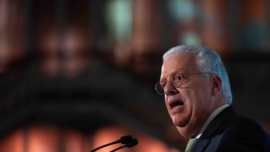Moscow hit back at Western countries Wednesday for sanctioning senior Russian officials over the poisoning of Kremlin critic Alexei Navalny, warning its foes “not to play with fire”.
The Kremlin accused Washington and Brussels of interference after the US and the EU introduced fresh penalties Tuesday over Navalny, who was jailed last month when he returned from Germany where he was recovering from exposure to a nerve agent.
The sanctions further erode ties between Moscow and the West since Russia’s annexation of Crimea in 2014.
“We believe such measures are absolutely unacceptable because they significantly damage already bad relations” with Washington and Brussels, Kremlin spokesman Dmitry Peskov told reporters Wednesday.
He said the new sanctions amounted to “interference” in Russia’s domestic affairs and vowed to take action in response, without specifying measures.
His comments echoed foreign ministry spokeswoman Maria Zakharova who warned the West earlier “not to play with fire” and said Russia would respond according to “the principle of reciprocity”.
“We will continue to systematically and resolutely defend our national interests and rebuff aggression,” she said in a statement published late Tuesday.
She later said Russia was already formulating its response, without giving details.
The sanctions announced Tuesday by Washington signal a harder line from President Joe Biden and target several individuals within Russia’s security sector, including Federal Security Service (FSB) head Alexander Bortnikov.
– ‘Outrageous’ FSB claims –
But Peskov on Wednesday again denied Russian involvement and said that claims the FSB was involved in a poisoning attack were “outrageous”.
Navalny maintains that his near fatal attack was carried out by the FSB on the orders of Russian President Vladimir Putin, a claim vehemently denied by the Kremlin.
Putin’s most vocal domestic critic in August was flown to Germany for treatment after falling violently ill on a flight from Siberia. European laboratories later concluded he was poisoned with the Soviet-era nerve agent Novichok.
The 44-year-old anti-graft campaigner, who has gained popularity for his investigations into the wealth of Russia’s elites, returned to Moscow in January only to be arrested and then sent to a penal colony for two and a half years for allegedly violating the terms of a suspended sentence.
His return and imprisonment spurred mass nationwide rallies in late January, decrying Putin’s two-decade rule and Navalny’s arrest.
Both Washington and Brussels have demanded Navalny’s immediate release while two United Nations human rights experts on Monday called for an international investigation into his poisoning.
by Anastasia CLARK




















